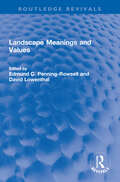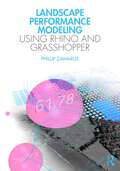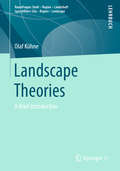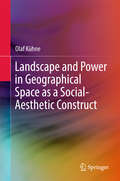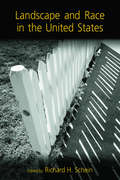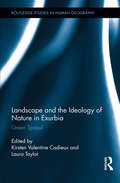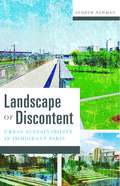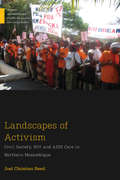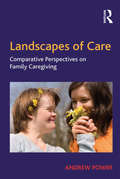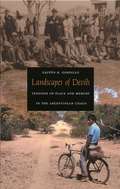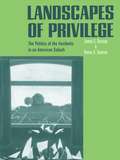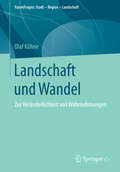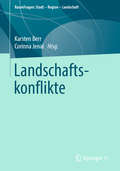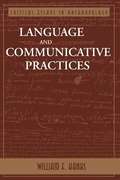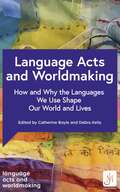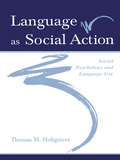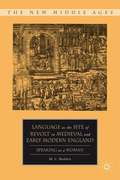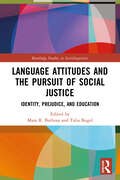- Table View
- List View
Landscape Meanings and Values (Routledge Revivals)
by Edmund C. Penning-Rowsell; David LowenthalFirst published in 1986, Landscape Meanings and Values presents a major contribution to the debate concerning the relationship between theory and practice in landscape analysis and planning. It brings together a number of the most eminent researchers, commentators and practitioners from both the United States of America and Britain to pursue the fundamental meanings and values in landscape. The insights into the theory behind landscape management will force a fundamental rethink of the role of landscape architect and land management. Academic researchers will find the feedback from eminent practitioners a stimulation for more practical research. The collection of ideas in the last chapter provides a unique synthesis of the need for an expansion of study into the fundamental significance of landscape today. This book will be of value to students of geography, environmental studies, landscape architecture and land management.
Landscape Performance Modeling Using Rhino and Grasshopper
by Phillip ZawarusThis is a guidebook for landscape architects to learn the fundamental practices and use of the computational software Rhino 3D and the plugin Grasshopper for parametric modeling, landscape inventory, and performative analysis. This process visually connects intangible and abstract information with physical and spatial relationships to signify the impact ecological, climate, and cultural factors have on landscape performance and decision making. Each chapter begins with a summary of the performance method and its application in different projects, outlining the expected goals from industry standard equations and operations. Chapters cover parametric modeling scripts to measure ecosystem services of stormwater management, erosion control, tree benefits, outdoor comfort, accessibility, and many others. Using photographs, tables, and parametric scripts to create qualitative and quantitative representations of landscape performance and ecosystem services, readers will learn to communicate the impact and significance of their outputs. This book will be beneficial to educators, students, and professionals interested in using computational modeling as a performance assessment and graphic visualization tool.
Landscape Theories: A Brief Introduction (RaumFragen: Stadt – Region – Landschaft)
by Olaf KühneIn the past decades, the discussion about theoretical approaches to the topic of 'landscape' has increased. This book presents the currently discussed theoretical approaches to landscape and shows its potentials and limits. The theoretical approaches are discussed on the basis of current questions, such as socialisation and the hybridisation of landscape, and combined with empirical results. This is followed by a discussion of the landscape policy operationalisation of theoretical considerations and empirical findings.
Landscape and Power in Geographical Space as a Social-Aesthetic Construct
by Olaf KühneThis book examines the power definiteness of landscape from a social constructivist perspective with a particular focus on the importance of aesthetic concepts of landscape in development. It seeks to answer the question of how societal notions of landscape emerge, how they are individually updated and how these ideas affect the use and design of physical space. It also analyzes how physical manifestations of societal activity impact on understandings of individual and societal landscapes and addresses the essential aspect of the social construction of landscape, cultural specificity, which in turn is discussed in the context of the expansion of a western landscape concept. The book offers an unprecedented, comprehensive and detailed examination of societal power relations in the context of landscape development. The numerous case studies from the physical manifestation of modern spatial planning in the United States, the power discourses concerning the design of model railway landscapes, and the medial production of stereotypical landscape notions shed light on the complex and multilayered interactions of collective and individual landscape references. It is a valuable resource for geographers, sociologists, landscape architects, landscape planners and philosophers.
Landscape and Race in the United States
by Richard H. ScheinLandscape and Race in the United States is the definitive volume on racialized landscapes in the United States. Edited by Richard Schein, each essay is grounded in a particular location but all of the essays are informed by the theoretical vision that the cultural landscapes of America are infused with race and America's racial divide. While featuring the black/white divide, the book also investigates other social landscapes including Chinatowns, Latino landscapes in the Southwest and white suburban landscapes. The essays are accessible and readable providing historical and contemporary coverage.
Landscape and the Ideology of Nature in Exurbia: Green Sprawl (Routledge Studies in Human Geography #39)
by Laura Taylor Kirsten Valentine CadieuxThis book explores the role of the ideology of nature in producing urban and exurban sprawl. It examines the ironies of residential development on the metropolitan fringe, where the search for “nature” brings residents deeper into the world from which they are imagining their escape—of Federal Express, technologically mediated communications, global supply chains, and the anonymity of the global marketplace—and where many of the central features of exurbia—very low-density residential land use, monster homes, and conversion of forested or rural land for housing—contribute to the very problems that the social and environmental aesthetic of exurbia attempts to avoid. The volume shows how this contradiction—to live in the green landscape, and to protect the green landscape from urbanization—gets caught up and represented in the ideology of nature, and how this ideology, in turn, constitutes and is constituted by the landscapes being urbanized.
Landscape of Discontent: Urban Sustainability in Immigrant Paris (A Quadrant Book)
by Andrew NewmanOn a rainy day in May 2007, the mayor of Paris inaugurated the Jardins d&’Éole, a park whose completion was hailed internationally as an exemplar of sustainable urbanism. The park was the result of a hard-fought, decadelong protest movement in a low-income Maghrebi and African immigrant district starved for infrastructure, but the Mayor&’s vision of urban sustainability was met with jeers. Drawing extensively from immersive, firsthand ethnographic research with northeast Paris residents, as well as an analysis of green architecture and urban design, Andrew Newman argues that environmental politics must be separated from the construct of urban sustainability, which has been appropriated by forces of redevelopment and gentrification in Paris and beyond. France&’s turbulent political environment also provides Newman with powerful new insights into the ways in which multiethnic coalitions can emerge⎯even amid overt racism and Islamophobia⎯in the struggle for more just cities and more inclusive societies. A tale of multidimensional political efforts, Landscape of Discontent cuts through the rhetoric of green cities to reveal the promise that environmentalism holds for urban communities anywhere.
Landscapes of Activism: Civil Society, HIV and AIDS Care in Northern Mozambique (Medical Anthropology)
by Joel Christian ReedAIDS activists are often romanticized as extremely noble and selfless. However, the relationships among HIV support group members highlighted in Landscapes of Activism are hardly utopian or ideal. At first, the group has everything it needs, a thriving membership, and support from major donors. Soon, the group undergoes an identity crisis over money and power, eventually fading from the scene. As government and development institutions embraced activist demands—decentralizing AIDS care through policies of health systems strengthening—civil society was increasingly rendered obsolete. Charting this transition—from subjects, to citizens, and back again—reveals the inefficacy of protest, and the importance of community resilience. The product of in-depth ethnography and focused anthropological inquiry, this is the first book on AIDS activists in Mozambique. AIDS activism’s strange decline in southern Africa, rather than a reflection of citizen apathy, is the direct result of targeted state and donor intervention.
Landscapes of Care: Comparative Perspectives on Family Caregiving
by Andrew PowerGiven the increasing shift of care from state residential services to community-based support, this book examines the complex geographies of family caregiving for young adults with intellectual disabilities. It traces how family ’carers’ are directly and indirectly affected by a broad array of law and policy, including family policy, disability legislation, and health and community care restructuring policy. Each of these has material and institutional effects and is premised on the discourses, ideologies, and interactions in the state over time. Focusing on the welfare models of England, the US and Ireland, this book compares the welfare ideologies in each country and examines how the specific historical, cultural, and political contexts give rise to different landscapes of care and disability. Further, the book explores the unique lifeworlds of family carers of young adults with intellectual disability within the broader landscape of care in which they are situated.
Landscapes of Devils: Tensions of Place and Memory in the Argentinean Chaco
by Gastón R. GordilloLandscapes of Devils is a rich, historically grounded ethnography of the western Toba, an indigenous people in northern Argentina's Gran Chaco region. In the early twentieth century, the Toba were defeated by the Argentinean army, incorporated into the seasonal labor force of distant sugar plantations, and proselytized by British Anglicans. Gastn R. Gordillo reveals how the Toba's memory of these processes is embedded in their experience of "the bush" that dominates the Chaco landscape. As Gordillo explains, the bush is the result of social, cultural, and political processes that intertwine this place with other geographies. Labor exploitation, state violence, encroachment by settlers, and the demands of Anglican missionaries all transformed this land. The Toba's lives have been torn between alienating work in sugar plantations and relative freedom in the bush, between moments of domination and autonomy, abundance and poverty, terror and healing. Part of this contradictory experience is culturally expressed in devils, evil spirits that acquire different features in different places. The devils are sources of death and disease in the plantations, but in the bush they are entities that connect with humans as providers of bush food and healing power. Enacted through memory, the experiences of the Toba have produced a tense and shifting geography. Combining extensive fieldwork conducted over a decade, historical research, and critical theory, Gordillo offers a nuanced analysis of the Toba's social memory and a powerful argument that geographic places are not only objective entities but also the subjective outcome of historical forces.
Landscapes of Privilege: The Politics of the Aesthetic in an American Suburb
by Nancy DuncanJames and Nancy Duncan look at how the aesthetics of physical landscapes are fully enmeshed in producing the American class system. Focusing on an archetypal upper class American suburb-Bedford in Westchester County, NY-they show how the physical presentation of a place carries with it a range of markers of inclusion and exclusion.
Landschaft als Prozess (RaumFragen: Stadt – Region – Landschaft)
by Olaf Kühne Florian Weber Rainer Duttmann,Landschaft‘ gehört in Deutschland zu einem vielgenutzten und in unterschiedlichen Kontexten eingesetzten Begriff – sowohl alltagsweltlich als auch wissenschaftlich. Die Veränderlichkeit von Landschaft wird häufig als Wandel verstanden. Im Verhältnis dazu wird deren Prozesshaftigkeit in diesem Sammelband als ein Spezialfall von Wandel gedeutet. Dieser Spezialfall ist in von Menschen geprägten Landschaften zielgerichteter und aktiver als der passive und auch ungerichtete Wandel. Der Begriff des Prozesses fokussiert zudem stärker die Kontextabhängigkeit von Veränderungen. Die Vielfalt der über 30 versammelten Beiträge zeigt, dass der Wandelbarkeit und konkret der Prozesshaftigkeit von Landschaft je nach Perspektive und Zielsetzung auf unterschiedliche Art und Weise nachgegangen werden kann. Es ist nicht die eine Grundkonzeption, die Erkenntnisgewinn verspricht, sondern mitunter je nach Zielsetzung eine spezifische Wahl oder eine neopragmatische Triangulation. In unterschiedlicher Ausprägung werden sowohl ,Landschaft’ als auch ,Prozess‘ einer Einordnung und Systematisierung zugeführt – durchaus auch je nach disziplinärem Hintergrund, womit sich eine Perspektivenvielfalt ergibt – als Grundlage für weitergehende Auseinandersetzungen mit dem Themenfeld ,Landschaft als Prozess‘.
Landschaft und Tourismus (RaumFragen: Stadt – Region – Landschaft)
by Olaf Kühne Corinna Jenal Tim Freytag Timo SedelmeierDer Sammelband hat zum Ziel, die vielfältigen Verflechtungen zwischen Landschaft und Tourismus aus unterschiedlichen Blickwinkeln zu beleuchten und zu reflektieren. Er stützt sich auf ein Verständnis von Landschaft als eine individuelle Konstruktion auf Grundlage erlernter gesellschaftlicher Deutungs- und Bewertungsmuster, auf Basis derer eine synthetische Zusammenschau materieller Objekte erfolgt. Alle drei Dimensionen sind veränderlich (die materielle, die individuelle und die gesellschaftliche) und über das Individuum miteinander verbunden. Die Gestaltung und Veränderung von Landschaften ist gebunden an Aushandlungsprozesse. Dabei ist wichtig, dass Landschaft nicht normativ im Sinne einer bestimmten Landschaft verstanden wird, sondern dass ein Nebeneinander von unterschiedlichen landschaftsbezogenen Konstruktionen (etwa infolge unterschiedlicher Interessen, kultureller Gebundenheiten, heimatlicher Bezugnahmen) und Repräsentationen zu Grunde gelegt wird. Schließlich beschränkt sich das Landschaftsverständnis nicht im Sinne eines ‚engen‘ Verständnisses auf klassische natur- und kulturwissenschaftliche Deutungen von materiellen Räumen, sondern folgt dem ‚weiten‘ Landschaftsverständnis, dass z.B. auch städtische Räume oder (Alt)Industrieareale unter dem Konstruktionsmodus ‚Landschaft‘ gefasst werden können.Übertragen auf den Bereich des Tourismus können verschiedene touristische Destinationen und andere touristifizierte Räume als Landschaften bezeichnet werden (z.B. die Toskana, ein hippes Stadtquartier in Barcelona, ein idyllischer Strand auf einer Insel der Karibik, ein einsamer Hiking-Trail im Hochgebirge, altindustrielle Areale und ihre Umgebungen im Ruhrgebiet oder das Walt Disney World Resort in Orlando).
Landschaft und Wandel: Zur Veränderlichkeit von Wahrnehmungen (RaumFragen: Stadt – Region – Landschaft)
by Olaf KühneSeit rund eineinhalb Jahrzehnten setzt sich in der deutschen Landschaftsforschung mit zunehmender Intensität die Erkenntnis durch, dass Landschaft aus sozialwissenschaftlicher Perspektive eher also gesellschaftliche und individuelle Konstruktion verstanden werden sollte, denn als physischer Gegenstand. Aktuelle theoretisch Überlegungen und empirische Befunde zu dieser Auffassung aufgreifend, befasst sich das vorliegende Buch mit der Betrachtung der zeitlichen Veränderlichkeit dieser sozialen Konstrukte von Landschaft am Beispiel einer Trendstudie im Saarland mit Erhebungen in den Jahren 2004 und 2016. Hierbei wird deutlich, wie groß die Entwicklung sozialer Deutungen und Bewertungen von Landschaft ist. Dies betrifft beispielsweise einerseits veränderte Einschätzungen von altindustriellen Objekten aber auch von Windkraftanlagen, andererseits auch die Aneignungsprozesse von Landschaft.
Landschaft zwischen Philosophie und Sozialwissenschaften: Eine Kritik (RaumFragen: Stadt – Region – Landschaft)
by Olaf Kühne Karsten Berr Petra LohmannDie Befassung mit ‚Landschaft‘ hat in den letzten Jahren in der Öffentlichkeit und den Wissenschaften an Bedeutung gewonnen. Verbunden war dies nicht vorwiegend mit den Konflikten, die sich in den letzten Jahren um physische Manifestationen der Verminderung von und Anpassung an den anthropogenen Klimawandel ergaben. In Philosophie und Sozialwissenschaften haben sich – nicht zuletzt ausgehend von einem gemeinsamen Bezugspunkt der ‚Philosophie der Landschaft‘ von Georg Simmel aus dem Jahre 1913 – unterschiedliche Traditionen im Umgang mit ‚Landschaft‘ entwickelt. Diese werden in dem vorliegenden Buch hinsichtlich ihrer Tauglichkeit einer Kritik unterzogen, Antworten auf die landschaftsbezogenen Herausforderungen der Gegenwart, sowohl in Bezug auf Wissenschaft, aber auch Gesellschaft zu leisten. Diese Kritik basiert auf einem eigens hierfür entwickelten kategorialen System, das sich zwischen den Dimensionen Konkretheit-Abstraktheit und wissenschaftsintern-wissenschaftsextern aufspannt. Zentrale herausgearbeitete Kritikpunkte sind neben einer unzureichenden Begriffsarbeit und einer ‚Individuenvergessenheit‘ beider Disziplinen auch die Reduzierung des Landschaftsbegriffs auf den Naturbegriff in der philosophischen Landschaftsforschung.
Landschaftsbilder und Landschaftsverständnisse in Politik und Praxis (RaumFragen: Stadt – Region – Landschaft)
by Cormac Walsh Gisela Kangler Markus SchaffertDie Governance von Raum, Natur, Umwelt und Kultur ist von unterschiedlichen Landschaftsbildern und Verständnissen von Landschaft geprägt. So haben Bürger*innen, Grundbesitzer*innen, Landschaftsarchitekt*innen, Landbewirtschafter*innen, Naturschützer*innen, Raumplaner*innen, Touristiker*innen eine Reihe von durchaus verschiedenen Lesarten von Landschaft: Natur- oder Kulturlandschaft, genutzte oder verwilderte Landschaft, Landschaft als Privat- oder Gemeinschaftsgut, Landschaft als Schutzgut oder Ressource, Landschaft als physischer Raum oder gesellschaftliches Konstrukt und andere. Die Beiträge in diesem Band machen deutlich, wie vielschichtig sich Landschaftsbilder und Landschaftsverständnisse heute erweisen und wie mannigfaltig die methodischen Entwicklungen und Projekte sind, mit denen wissenschaftliche Erkenntnisse in die Praxis der Governance-Prozesse eingebracht werden.
Landschaftskonflikte (RaumFragen: Stadt – Region – Landschaft)
by Corinna Jenal Karsten BerrKonflikte um die Energiewende, um die Ausweisung neuer Nationalparks und die Planung von Städten haben eines gemeinsam: jeweils werden landschaftliche Deutungen als Argument für Erhalt oder Veränderung von beteiligten Konfliktparteien vorgebracht. Solche Konflikte lassen sich daher als Landschaftskonflikte verstehen. Der Band bringt verschiedene theoretische wie praktische Perspektiven auf ‚Konflikt‘ und ‚Landschaft‘ zusammen und fragt nach Gemeinsamkeiten und Unterschieden landschaftlicher Konflikte, die sich beispielsweise im Kontext von Stadt(Landschaften), Großschutzgebieten, Naturschutzfragen, Wildnisentwicklung oder im Zuge der Energiewende ergeben.
Landschaftstheorie und Landschaftspraxis: Eine Einführung aus sozialkonstruktivistischer Perspektive (RaumFragen: Stadt – Region – Landschaft)
by Olaf KühneDas Buch befasst sich mit der Frage, aufgrund welcher gesellschaftlicher Konventionen wir Landschaft sehen, deuten und bewerten. Dabei wird ein besonderer Blick auf die Entwicklung von Landschaftsverständnissen im deutschen Sprachraum, im Vergleich zu anderen Sprachräumen, gerichtet. Ausgehend von einer sozialkonstruktivistischen Perspektive werden in dem Buch sowohl unterschiedliche Theorien zum Thema Landschaft aus den Sozial- und Kulturwissenschaften wie auch praktische Fragen zum Umgang mit Landschaft von der Deutung der Hybridisierung von Städtischem und Ländlichem bis hin zu der Energiewende und der Integration der Fragen von ästhetischer Konstruktion von Landschaft in Planungsprozessen beleuchtet. In den vergangenen Jahren hat sich die Forschung um das Themenfeld „Landschaft“ erheblich intensiviert und vervielfältigt. In der 3. Auflage wird dieser Umstand berücksichtigt, so hat sich etwa eine umfangreichere Forschung zur Bedeutung von Landschaften in Spielen und in und mit virtuellen Räumen entwickelt, auch gewannen die Diskussionen um Nahrungslandschaften an Kontur. Seit der Veröffentlichung der 2. Auflage erreichten auch More-than-representational-Ansätze in der Landschaftsforschung eine größere Bedeutung und werden nun in der 3. Auflage behandelt.
Landside | Airside: Why Airports Are the Way They Are
by Victor MarquezWhy do we love and hate airports at the same time? Have you been a victim of tiresome walks, congestion, long lines, invasive pat-downs, eternal delays and so on? Perhaps no other technological system has been challenged by continuously changing paradigms like airports. Think a minute on rail stations; think of how successful are the rail networks of the world in connecting nations, with just minimum security measures. Why aviation and airports are so radically different in this regard?In order to answer those questions the author embarks on a thorough revision of airport history and airport planning that in the end builds up a new theory about how airports are formed from the outset. Within its journey from the early airfield to the newest hubs of today, Dr. Marquez identifies for the first time the Landside–Airside boundary as the single most important feature that shapes an airport. In this sense, his finding challenges the “historical linearity” that, until today, used to explain a century of airports.From both an analytical and theoretical S&TS stance, Dr. Marquez assures that it is only when airports needed to be fully reinvented (LaGuardia, Dulles and Tampa) when they become transparent and we may be able to understand their lack of technological stability.
Language & Communicative Practices (Critical Essays in Anthropology)
by William F. HanksThis introduction to the study of language in context presents a provocative new approach to communicative practice. William Hanks offers fresh insights into the dynamics of context, the indeterminacy of cultural forms, and the relation between human experience and the making of meaning. He explores the varieties of reflexivity in language, relating them to linguistic structure, textuality, and genres of practice.
Language Acts and Worldmaking: How and Why the Languages We Use Shape Our World and Our Lives
byCollectively authored by the Language Acts and Worldmaking team, this defining volume offers reflective narratives on research, theory and practice over the course of the flagship project of the same name, funded by the Arts and Humanities Research Council's Open World Research Initiative. It returns to the project's key principles - that our words make worlds and we are agents in worldmaking - analyses the practices and outcomes of collaborative working, and looks to the future by offering concrete ideas for how the work they have done can now continue to do its work in the world.Focusing on the key research strands, this volume looks at the role of the language teacher as a mediator between languages and cultures, worldmaking in modern languages, translation and the imagination, languages and hospitality, digital mediations, and how words change and make worlds. Critically, it analyses the impact on communities of living in multilingual cities, and the ways in which learning a first language, and then a second, and so on, plays a crucial role in our ability to understand our culture in relation to others and to appreciate the ways in which they are intertwined.Specific aims are to: · propose new ways of bridging the gaps between those who teach and research languages and those who learn and use them in everyday contexts from the professional to the personal · put research into the hands of wider audiences · share a philosophy, policy and practice of language teaching and learning which turns research into action · provide the research, experience and data to enable informed debates on current issues and attitudes in language learning, teaching and research · share knowledge across and within all levels and experiences of language learning and teaching · showcase exciting new work that derives from different types of community activity and is of practical relevance to its audiences · disseminate new research in languages that engages with diverse communities of language practitioners.
Language Acts and Worldmaking: How and Why the Languages We Use Shape Our World and Our Lives
byCollectively authored by the Language Acts and Worldmaking team, this defining volume offers reflective narratives on research, theory and practice over the course of the flagship project of the same name, funded by the Arts and Humanities Research Council's Open World Research Initiative. It returns to the project's key principles - that our words make worlds and we are agents in worldmaking - analyses the practices and outcomes of collaborative working, and looks to the future by offering concrete ideas for how the work they have done can now continue to do its work in the world.Focusing on the key research strands, this volume looks at the role of the language teacher as a mediator between languages and cultures, worldmaking in modern languages, translation and the imagination, languages and hospitality, digital mediations, and how words change and make worlds. Critically, it analyses the impact on communities of living in multilingual cities, and the ways in which learning a first language, and then a second, and so on, plays a crucial role in our ability to understand our culture in relation to others and to appreciate the ways in which they are intertwined.Specific aims are to: · propose new ways of bridging the gaps between those who teach and research languages and those who learn and use them in everyday contexts from the professional to the personal · put research into the hands of wider audiences · share a philosophy, policy and practice of language teaching and learning which turns research into action · provide the research, experience and data to enable informed debates on current issues and attitudes in language learning, teaching and research · share knowledge across and within all levels and experiences of language learning and teaching · showcase exciting new work that derives from different types of community activity and is of practical relevance to its audiences · disseminate new research in languages that engages with diverse communities of language practitioners.
Language As Social Action: Social Psychology and Language Use
by Thomas M. HoltgravesThis interdisciplinary synthesis of the social psychological aspects of language use provides an integrative and timely review of language as social action. The book successfully weaves together research from philosophy, linguistics, sociolinguistics, anthropology, social and cognitive psychology, pragmatics, and artificial intelligence. In this way, it clearly demonstrates how many aspects of social life are mediated by language and how understanding language use requires an understanding of its social dimension. Topics covered include: *speech act theory and indirect speech acts; *politeness and the interpersonal determinants of language; *language and impression management and person perception; *conversational structure, perspective taking; and *language and social thought. This volume should serve as a valuable resource for students and researchers in social psychology and communication who want a clear presentation of the linguistic underpinnings of social interaction. It will also be useful to cognitive psychologists and other language researchers who want a thorough examination of the social psychological underpinnings of language use. Although this book is relevant for a variety of disciplines, it is written in a clear and straightforward style that will be accessible for readers regardless of their orientation.
Language As The Site Of Revolt In Medieval And Early Modern England
by M. C. BoddenThis bookmakes the provocative argument thatdespite extensive evidence indicating a wholesale suppression of early women's speech, women were actively engaged in cultural practices and speech strategies that weresimultaneously complicitous with patriarchal ideology and subversive in undermining that ideology. "
Language Attitudes and the Pursuit of Social Justice: Identity, Prejudice, and Education (Routledge Studies in Sociolinguistics)
by Mara R. Barbosa Talia BugelLanguage Attitudes and the Pursuit of Social Justice explores the relationship between language attitudes and forms of inequality and oppression, fostering greater awareness of how linguistic choices become political ones and encouraging the search for practices that promote social justice.The volume is organized around different sections that look at language attitudes and their intersections with different dimensions of contemporary social and cultural life, including language policy and planning, language and education, and the role of identity in forming strong communities that promote multilingualism and multiculturalism. Both established and emerging scholars explore the ways in which language attitudes are informed by extralinguistic factors, drawing on case studies involving French, Italian, and Spanish in Canada; interaction of migrant languages in Austria; national languages in West Africa and Senegal; signed languages in Spain; Spanish in Aruba, Uruguay, the US, Catalonia, and Majorca; and Quechua in Peru. The collection urges the development of critical linguistic awareness and a view of languages which recognizes that they shift and change across time and space.This book will be of particular interest to scholars of sociolinguistics, multilingualism, language education, language policy and planning, and bilingual education.
